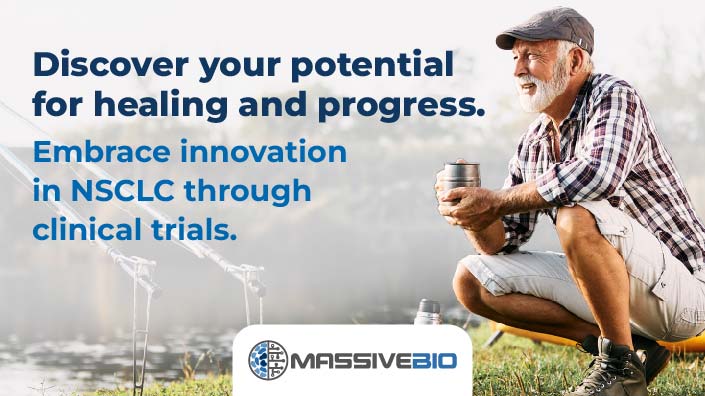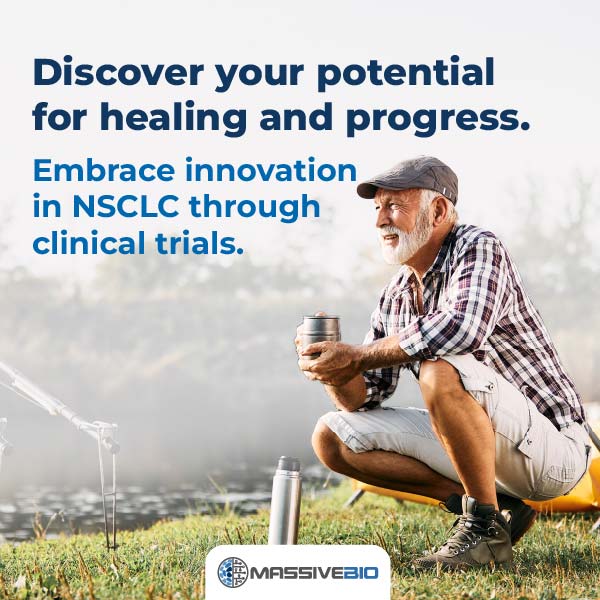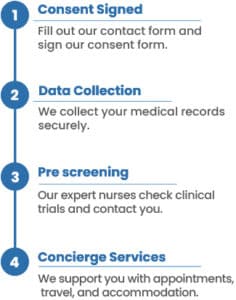News
Massive Bio Has Onboarded Over 120,000 Cancer Patients to Find Their Clinical Trial
Non-Small Cell Lung Cancer Clinical Trials
If you have advanced non-small cell lung cancer (NSCLC), you should think about joining clinical trials as your best choice.
Compliant with

You can receive a guidebook with information about lung cancer by filling out the form.
Innovative Therapies for Non-Small Cell Lung Cancer
If you are looking for non-small cell lung cancer treatment, Massive Bio can assist you. Our advanced artificial intelligence (AI) platform will recommend treatment options through clinical trials tailored to your specific condition. Once you submit your information, our oncology experts will review your advanced Lung cancer case and contact you.
Understanding treatment options is crucial when facing locally advanced, inoperable, or metastatic Non-Small Cell Lung Cancer diagnosis. Our role is to link patients with a pioneering clinical trial dedicated to creating novel and targeted treatments. These therapies are tailor-made to tackle the specific hurdles posed by locally advanced or metastatic Lung cancer, and they are offered free of charge to those participating in the trial.


When you register for our matching service, we’ll help you find clinical trials for free that are a good fit for your situation.
Here’s how it works:
Diagnosis: If you have been diagnosed with non-small cell lung cancer, including stage 3 inoperable NSCLC or stage 4 NSCLC, you might qualify for participation in innovative and promising clinical trials.
What is the usual classification of Lung cancer?
- Non-Small Cell Lung Cancer (NSCLC): NSCLC accounts for about 80-85% of all lung cancer cases, with prognosis varying by stage; early-stage NSCLC has higher survival rates, while advanced stages have a poorer prognosis. Key biomarkers for NSCLC include EGFR, ALK, TP53, MDM2, PD-L1, and KRAS, which guide targeted and immunotherapy treatments. Clinical trials for NSCLC either mutated or non-mutated genes to be eligible for their trials.
- Small Cell Lung Cancer (SCLC): SCLC represents 10-15% of lung cancer cases and is known for its aggressive nature and rapid spread, resulting in a generally poorer prognosis. Biomarkers for SCLC include neuroendocrine markers (chromogranin A, synaptophysin, NSE), PD-L1, and MYC amplification. SCLC trials typically explore new chemotherapy regimens and treatments targeting neuroendocrine markers.
Patients with both NSCLC and SCLC can find numerous clinical trials offering access to the latest and most advanced treatments tailored to their specific cancer characteristics.
Subtypes of Non-Small Cell Lung Cancer (NSCLC)
Squamous Cell Carcinoma: Originates in the squamous cells lining the airways, commonly associated with a history of smoking and typically found in the central part of the lungs near the main airway (bronchi).
Non-Squamous Cell Carcinoma:
- Adenocarcinoma lung cancer starts in the cells that produce mucus in the outer part of the lungs. Is the most common lung cancer in non-smokers and is more often found in women. Clinical trials offering Adenocarcinoma Lung Cancer treatment often require specific genetic mutations for enrollment, as this subtype frequently harbors genetic mutations.
- Large Cell Carcinoma: Can appear in any part of the lung and tends to grow and spread quickly, making it a more aggressive subtype.
- Other Less Common Non-Squamous Types: Includes rare subtypes like sarcomatoid carcinoma and adenosquamous carcinoma, each with unique cellular characteristics and behaviors.
Most clinical trials for advanced non-squamous NSCLC, including Stage 3 non-squamous NSCLC or Stage 4 non-squamous NSCLC, focus on patients with unresectable tumors. These trials offer a crucial opportunity to explore innovative therapies for those with limited treatment options, motivating patients to enroll and potentially benefit from cutting-edge treatments
What is an Advanced Stage NSCLC?
Knowing the 2 main different NSCLC types, it is important to know that most clinical trials focus on discovering Advanced NSCLC treatments thats why is important to know that into two main stages belong to the definition based on extent of the disease:
- Locally advanced NSCLC (Stage 3 Lung Cancer): is characterized by the spread of cancer to nearby tissues and lymph nodes, but not to distant parts of the body. Trials aimed at Stage 3 Non Small Cell Lung Cancer focus on patients with unresectable tumors because these patients have limited treatment options and a higher need for innovative therapies to manage their disease.
- Metastatic NSCLC (Stage 4 Lung Cancer): is characterized by the spread of cancer to distant parts of the body, such as the brain, bones, liver, or other organs. Most trials for Stage 4 Non-Small Cell Lung Cancer focus on patients with unresectable tumors due to their limited treatment options and the urgent need for innovative therapies to manage the disease.
Clinical trials play a crucial role in advancing the treatment of both Stage 3 NSCLC trials and Stage 4 NSCLC trials (also known as Stage III NSCLC trials and Stage IV NSCLC trials respectively). They offer patients access to cutting-edge therapies that may provide better outcomes and improved quality of life.
Treated vs. Untreated Non-Small Cell Lung Cancer (NSCLC)
- Treated NSCLC is cancer that has been treated with surgery, chemotherapy, radiation, targeted therapy, or immunotherapy. These treatments are used to manage and control the disease. Some clinical trials may require patients to have received prior treatments to be eligible for innovative new therapies.
- Untreated NSCLC: Refers to Lung Cancer that has not yet received any form of oncologic treatment, including systemic therapies or specific medications. This can apply to any stage of the disease, from early to advanced stages.
Resectable vs. Unresectable Lung Cancer
- Resectable Lung Cancer: Refers to cancer that can be surgically removed, typically confined to the lungs and nearby lymph nodes without extensive spread. This generally includes Early (Stage I), Localized (Stage II) and some cases of Stage IIIA.
- Unresectable Lung Cancer: Refers to cancer that cannot be surgically removed due to its size, location, or extent of spread to other parts of the body. This usually includes stages IIIB and IV, and some cases of stage IIIA, requiring alternative treatments such as chemotherapy, radiation, or targeted therapy.
Clinical trials for unresectable NSCLC explore advanced therapies such as targeted drugs and immunotherapy, providing patients access to the latest treatments. These trials aim to improve survival rates and quality of life.
Enhancing Your Treatment Prospects with Genomic Testing
NGS Biomarkers and Their Importance in NSCLC
Next-Generation Sequencing (NGS) is crucial for identifying key biomarkers in Non-Small Cell Lung Cancer (NSCLC), which help guide personalized treatment and determine eligibility for clinical trials. These are some important biomarkers:
- EGFR (Epidermal Growth Factor Receptor): is a protein found on the surface of some cells in your body. It plays a key role in regulating cell growth and division. In certain types of lung cancer, the EGFR protein is mutated or overactive, causing cells to grow and divide uncontrollably, leading to tumor growth. Targeted therapies have been developed to specifically block the activity of EGFR thereby slowing down or stopping the cancer’s progression. This makes EGFR a crucial target in the treatment of cancers with these specific genetic characteristics.
- KRAS (Kirsten Rat Sarcoma Viral Oncogene Homolog): KRAS mutations drive cancer cell proliferation and are common in NSCLC.
- ALK (Anaplastic Lymphoma Kinase) Rearrangement Positive: ALK rearrangements lead to abnormal cell signaling and growth.
- ROS1 Rearrangement Positive: ROS1 rearrangements cause abnormal cell growth similar to ALK rearrangements. Trials focus on ROS1 inhibitors for these patients.
- BRAF V600E Mutation Positive: BRAF V600E mutations result in uncontrolled cell division.
- NTRK1/2/3 Gene Fusion Positive: NTRK gene fusions create abnormal proteins that drive cancer growth.
- METex14 Skipping Mutation Positive: MET exon 14 skipping mutations lead to prolonged MET signaling, promoting cancer growth.
- RET Rearrangement Positive: RET rearrangements activate abnormal cell signaling pathways.
- ERBB2 (HER2) Mutation Positive: HER2 mutations cause excessive cell growth and division.
IHC Biomarkers and Their Importance in NSCLC
Immunohistochemistry (IHC) biomarkers are crucial in diagnosing and determining the appropriate treatment for non-small cell lung cancer (NSCLC). Some of the most significant IHC biomarkers for the NSCLC treatment and relevant for clinical trials include:
- PD-L1 (Programmed Death-Ligand 1): is a protein expressed on the surface of cancer cells that binds to the PD-1 receptor on T-cells, turning off the immune response against the cancer. High PD-L1 expression suggests that the tumor may respond well to immunotherapies anti PD-L1 therapies.
- MMR (Mismatch Repair): MMR proteins are involved in the repair of DNA replication errors. Deficiency in MMR leads to microsatellite instability (MSI), which can result in increased mutation rates within tumors. MMR deficiency is associated with high levels of MSI (MSI-H), which can make tumors more responsive to immunotherapy.
Knowing this helps doctors decide which treatments to use and enhance the possibility of getting targeted treatment like the ones offered in clinical trials.
What are the benefits of clinical trials?
- Innovative Therapy: Clinical trial therapies represent the forefront of medical science and technology, tailored specifically to treat various forms of liver cancer (HCC treatment). These advanced treatments are designed for conditions like locally advanced and metastatic liver cancer.
- Personalized Match: We recognize that every patient is unique. That’s why we focus on pairing you with a treatment plan that aligns with your specific requirements and medical history.
- Expert Guidance: Throughout your journey, our experienced team of medical professionals will be by your side, providing guidance, support, and answering any questions you may have regarding your liver cancer treatment.
By signing up for our matching program, you’re taking an active role in exploring new possibilities and gaining access to an innovative therapy that can potentially transform your life.
We combine the power of technology with our dedicated team of medical providers to find you the best treatment options available.
Access the free matching toolAn NSCLC Clinical Trial May Be an Option for You


We offer a quick, easy and FREE way to find non-small cell lung cancer clinical research opportunities for patients like you. With our unique clinical trial matching system (CTMS) and team specialized in oncology, we can rapidly match you to a clinical research study for those diagnosed with NSCLC, and get into a new Lung Cancer Treatment.
Talk to us. Our nurses and patient relations coordinators are here and happy to help you. You are not alone in this fight.
Call +1 844 627 7246What is a Non-Small Cell Lung Cancer clinical trial?
Clinical trials test the latest scientific advancements in Non-Small Cell Lung Cancer treatment. Patients who choose to enroll in trials can receive cutting-edge treatment and high-quality care under the direction of scientists, doctors, and researchers. Non-Small Cell Lung Cancer patients might gain access to promising drugs and innovative treatments long before they're made available to the public.
You are not alone
You can have an experienced team with you
What Are Clinical Trials?
Cancer is an unfortunate reality that touches most of us at some point in our lives. If you or a loved one has cancer, you may have heard or read that clinical trials could offer access to innovative new treatments. But what exactly is a clinical trial? In this video, Massive Bio co-founder Arturo Loaiza-Bonilla, MD, explains how clinical trials work, what to expect if you enroll in one, and why a clinical trial can be an important treatment option for many cancer patients.
We dream of the day when cancer disappears from our lives. Massive Bio is working tirelessly on achieving that goal.
-
Why should I trust Massive Bio?
Why should I trust Massive Bio?
Massive Bio has provided health to more than 120,000 cancer patients in 25 countries across three continents. It collaborates with over 80 global partners. In 2022, Massive Bio became part of the Precision Cancer Consortium (PCC), alongside major companies such as AstraZeneca, Bayer, Eli Lilly & Company, GSK, Johnson & Johnson/Janssen, Novartis and Roche.
-
What is the process?
What is the process?
To find the best clinical research studies for you, we need your medical history and consent. You can provide this consent by filling out the form on this page and the following pages. Once you’ve done that, our patient relations coordinator will contact you to discuss the details and provide further information for clinical research matching report.
-
Why do I have to provide my medical records to enroll in a clinical trial?
Why do I have to provide my medical records to enroll in a clinical trial?
To enroll in clinical trial, you must meet highly specific criteria that’s established by the researchers who are conducting the investigation. That includes detailed information about type of cancer, treatment history, response to treatment, and other data that is collected in medical records.
-
What should I do if I don’t have my medical records?
What should I do if I don’t have my medical records?
If you are being treated for cancer or any other disease, your doctor should have a complete record of your medical care, including specific information about what form of the disease you have and what treatments you have received. Your patient relations coordinator will contact you and inform you about the details.
-
What are the costs associated with Massive Bio’s services?
What are the costs associated with Massive Bio’s services?
Massive Bio provides its services to the patients and their doctors at no cost—you won’t have to pay anything to receive a clinical-research matching report. There are no hidden costs involved.
-
How does Massive Bio protect my personal information?
How does Massive Bio protect my personal information?
Massive Bio strictly adheres to all HIPAA guidelines and international regulations focused on maintaining your privacy. We take extra measures to secure your personal information, ensuring it is protected beyond the mandatory requirements.
-
Where can I find clinical research studies in my area?
Where can I find clinical research studies in my area?
Your doctor may know of a clinical research study being conducted in your area that’s recruiting participants and is right for you. However, Massive Bio uses its artificial intelligence-powered platform to match patients to clinical research studies of treatments that give you the best chance of a positive outcome and are being conducted in a geographical location that makes sense for you.
-
Can I continue seeing my doctor or oncologist while also taking services of Massive Bio?
Can I continue seeing my doctor or oncologist while also taking services of Massive Bio?
Yes, Massive Bio keeps your doctor up to date on your status throughout your participation.




































